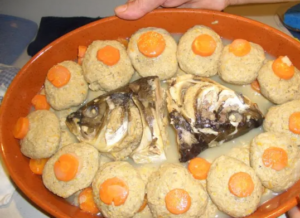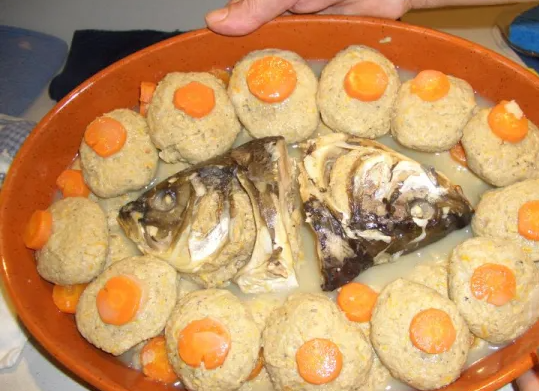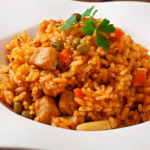Ingredients to make boiled Guefilte fish:
- 1½ kilograms of white fish to choose
- 4 large onions
- 4 eggs
- 3 carrots
- 2 tablespoons of Butter
- 1 jet of Oil
- 1 pinch of salt
- 1 pinch of Pepper
How to make Boiled Guefilte fish:
- The fish fillets are ground and a raw ground onion and 2 finely cut onions are added and sautéed in oil.
- Add the eggs and season with salt and pepper.
- Mix the preparation and add water slowly, beating, all that the fish absorbs.
- In a saucepan we prepare the sauce to cook the fish.
- Put in the bottom the clean fish bones and heads, without eyes or gills, the remaining onion and sliced carrots, the golden skin of the onions that will give color to the sauce, 2 tablespoons of coarse salt, plenty of pepper, the oil and butter.
- Bring to a boil with plenty of water.
- Form fish balls with wet hands, with the preparation made, the size of no more than an egg and when the sauce boils, carefully add them.
- Cook over low heat for 1 hour to 1 hour 30, the sauce should not simmer.
- Let the meatballs cool in the bro.
- Serve on plates putting only the fish balls and on top of each one a slice of the cooked carrots, accompanied by jrein, a very spicy sauce also known as horseradish sauce.
- To drink a white wine “kosher le pesaj”.
- Pesaj is the festival that commemorates the departure of the children of Israel from Egypt and is celebrated this year, starting today (April 8), for seven days, of which the first and last are days of repose; in the Diaspora the celebration extends to eight days, of which the first two and the last two are holidays.
- The etymology of the term Pesaj is given to us in the Bible itself: it comes from a PSJ root of a verb that means “to skip”, “to pass over” and refers to the fact that in the last of the ten plagues that occurred in Egypt before After Pharaoh consented to let the people of Israel depart, the angel of death sent by God “spread over the houses of the children of Israel.”
- Although there are discrepancies in this regard among scholars, the second half of the 13th century BC in the time of Pharaoh Ramses II is generally accepted as the time of this departure from Egypt.
- With this, then, Moses would have had his efforts to obtain the liberation of the people of Israel subjected to slave labor, negotiations reinforced each time by a new plague that came to Egypt, because the king refused to grant them freedom.
- Until with the tenth and last, the death of the firstborn, the monarch ordered at night that the children of Israel leave their country immediately.
- The tradition of unleavened bread or matzot is due to this sudden order of departure, which also characterizes this festival: time was not enough to cook the usual daily bread in the ovens, but rather the dough had to be left in the sun to cook. In its heat.
- The result was some flat and unfermented cookies, in memory of which we eat to this day, the traditional Pesach matzot during the seven or eight days of the party and we avoid the consumption of bread, biscuits, cakes, sourdough foods (chametz) that we usually eat during the rest of the year.
- The chametz is all food made from wheat, rye, barley or oats mixed with water and whose dough has fermented; Ashkenazi Jews also include rice and various legumes on the prohibition list.
- In the same way there are also some drinks and liquids considered chametz, because they are involved in their production fermented than if they are.
- The Seder of Pesach: Seder means “order” in Hebrew and with this name the festive dinner of the first night of Pesach is called (in the Diaspora the first and the second) due to the pre-established “order” that all blessings must keep, ceremonies, food and drinks in this celebration.




